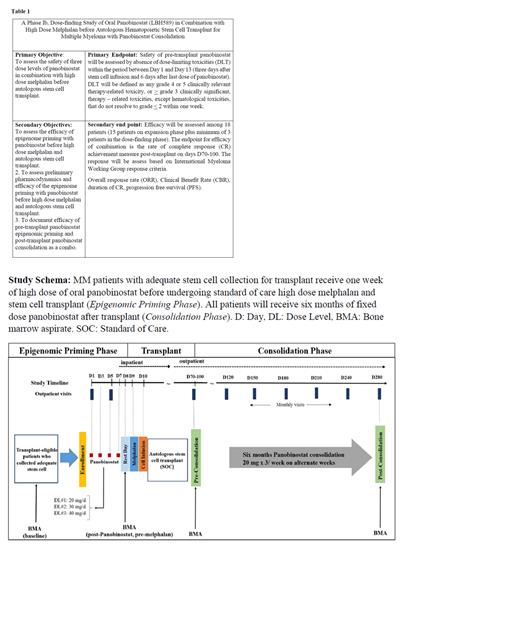Abstract
Despite the rich armamentarium of novel agents that are available to treat multiple myeloma (MM), high dose melphalan (HDM) and stem cell transplant (SCT) remain an essential therapy that achieves long-term durable remissions. However, most patients relapse following HDM-SCT due to the persistence of minimal residual disease (MRD). Therefore, there remains an unmet clinical need to overcome chemoresistant MRD and potentially achieve a cure for MM patients. Here, we describe a phase Ib trial designed to epigenetically priming with pre-transplant oral panobinostat to increase MRD sensitivity to HDM-SCT.
The contribution of dysregulated gene silencing to epigenomic alterations in cancer development provides a strong rationale for the use of epigenetic modulators, such as the histone deacetylase (HDAC) inhibitor panobinstat as anti-myeloma therapy. Access to DNA is primarily governed by chromatin structure such that its configuration is under control of histone acetylators and deacetylators. Inhibition of histone deacetylases weakens the histone-DNA bonds and decondenses chromatin, i.e., epigenetic priming, which potentially enhances sensitivity to melphalan. Pre-clinical studies have demonstrated a strong synergistic effect between panobionostat (LBH589) and melphalan in in vitro as well as in vivo studies utilizing patient-derived xenograph models, i.e., SCID-hu model of human MM, LAG-1(Sanchez et al. Leukemia research. March 2011). Furthermore, HDAC inhibitors suppress multi-drug resistance protein-1 (MRP1) and it can count as another mechanism of synergy for this class of drugs and alkylating agents in hematologic disorders (Tsubaki M. et al. Leukemia research. Oct 2012). Taken together, these studies support HDAC inhibitors in combination with melphalan to augment anti-myeloma efficacy of HDM-SCT. Here, we propose the combination through a pre-SCT epigenetic priming phase with high dose panobinostat and a post-SCT lower dose panobinostat consolidation phase (Study Schema).
Trial design: We propose a Simon 3+3 design to test panobinostat at three dose levels of 20, 30 and 40 mg every other day for four doses prior to high dose melphalan as study schema illustrates. There will not be any intra-patient dose escalation. The study will be extended to another 15 patients at the maximum tolerated dose for the pre-SCT phase. All patients regardless of the pre-SCT panobinostat dose level will received fixed dose of Panobinostat. Primary and Secondary objectives and endpoints are listed in Table 1.
Rationale for high dose panobinostat in epigenomic phase: Previous reports of HDACi combined with standard-dose chemotherapy (e.g., Ifosfomide, Carboplatin, and Etoposide for lymphoma or 7+3 for acute myeloid leukemia) had shown prolonged myelosuppression as the main adverse effect, but no significant increase in the non-hematological toxicities. Therefore, we predict the use of peripheral blood progenitor cells in the offered study has potential to circumvent the increased myelotoxicity associated with pre-SCT high dose panobinostat, and it may render the opportunity to test higher doses such as 40 mg every other day before SCT as epigenetic priming strategy.
Rational for low dose panobinostat dosing for the consolidation phase: The Panobinostat consolidation design will follow the positive landmark trial by the Australian group (Mithraprabhu S. et al. British J. Hemat. Apr 2021). In their study panobinostat was given at 20 mg three times weekly on alternate weeks for 6 months started 8-12 weeks post-transplant was administered. Forty eight percent of patients improved their depth of response after a median range of 4.3 months of panobinostat. In responders, T lymphocyte histone acetylation increased after both three cycles and six cycles of panobinostat when compare to baseline, with no differences in no-responders.
Malek: Janssen: Other: Advisory board ; Bluespark Inc.: Research Funding; BMS: Honoraria, Research Funding; Amgen: Honoraria; Cumberland Inc.: Research Funding; Sanofi: Other: Advisory Board; Medpacto Inc.: Research Funding; Takeda: Honoraria. Metheny: Incyte: Speakers Bureau; Pharmacosmos: Honoraria. Stricker: Secura Bio: Current Employment.
Panobinostat has been used as single agent therapy before and after transplant in this trial.


This feature is available to Subscribers Only
Sign In or Create an Account Close Modal